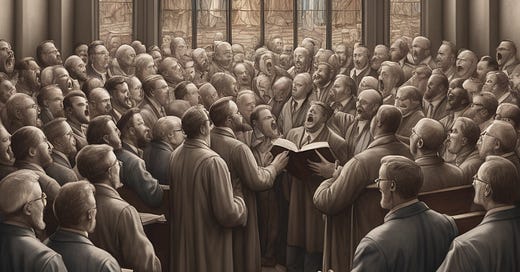Many men have not been taught how to be men in part because they have not been taught how to sing like men.
We don’t normally listen to Christian radio. But a few months ago I put on a particular Christian station in the car just to see if things were as I had remembered. A typical worship song was playing with a male singer in the usual style to which we’ve all become accustomed. After no more than five seconds, my 6-year old daughter (the one I mentioned in the last post) turned to me and said:
“Dadda, I’m glad our church doesn’t sing boy barbie songs…”
I had to laugh both at her child-like candour and her astute perception. She wasn’t wrong. This song, though entirely “normal”, didn’t sound natural. It’s just not how men are meant to sing. Sometimes it takes a 6-year old girl to tell it like it is. “Out of the mouth of babes…” as Psalm 8:2 says!
Over the next few weeks I put the same radio station on a few times every now and then just to see if there was any variation, and there really wasn’t. It’s the same literally every time: either women singing emotively about the intensity of their relationship with God, or men (in unusually high pitch) singing emotively about the intensity of their relationship with God.
Yes, there are also occasional tips of the hat to God’s general praiseworthiness, greatness, etc., but these often seem like line-fillers amidst the larger emotional tsunami of what has become the modern worship song, which tends to be more about us than God, and basically apes popular love songs. They are, as Mark Driscoll used to call them, “Jesus-is-my-boyfriend” songs.
If someone occasionally does sing about God it’s usually the same pool of generic and abstract phrases which crop up in every other song, with the general tenor centring on God’s love. It’s not that we shouldn’t sing about God’s love for us, of course. God’s love is wonderful and praiseworthy. It’s entirely understandable that we evangelicals should want to sing about it. It’s just that God gave us a whole book of songs with a lot more to sing about than just that, and with far sharper teeth than what the modern pop worship song tends to evoke.
You can guarantee that vast quantities of the content of the psalms will never see the light of day on any Christian radio station today. And isn’t that interesting, when you think about it? Think about the swathes of worship leaders and radio stations and song writers out there—thousands and thousands of them—whose primary aim is to produce and broadcast worship music, and yet will overlook the vast majority of the authoritative worship songs which God actually inspired for us to praise Him.
The radio stations, like the worship leaders, are merely acting in alignment with the broader trends in the Church, which gets the worship songs it desires, settling for what is comfortable and agreeable. And it does seem rather undeniable that modern evangelical churches appear to have a thing for “boy barbie songs”.
The Price of Effeminate Worship
It’s difficult to calculate the level of collateral damage caused by effeminised worship in the Church, particularly on men and boys. But it also affects women and girls too, who increasingly grow up either confused or disappointed that Christian men are increasingly trained to sing (and act) more like women than men.
Those men who cannot be taught to sing like women often just stop singing at all, or they mime under their breath, or sing absentmindedly, barely processing the generic sentiments that no longer even register with them. Men not bound by a particular duty to keep showing up each week will often just stop going altogether. The worship songs became too saccharine, severed from the sharp edges of reality.
Ironically, this is alien from the weird and wonderful world of the Psalms, which are full of historical particularity, contextual detail, a sense of place, sharp exhortation, human dignity, daring adventure, missional camaraderie, severe judgement, rapturous delight, devastating mockery, high drama, potent analogy, glorious exultation, and—above all—barefaced honesty.
So much of this is what so many of the modern winsome churches choose to exclude from the church living room as “unapproved” themes for public worship. Perhaps they know better than God? But who knows how many men left such churches because they couldn’t follow the perpetual softening (or outright absence) of masculine motifs, expressions, and presence in worship? And over time, who knows what effect this softening had on the men who stuck around?
Keep reading with a 7-day free trial
Subscribe to That Good Fight to keep reading this post and get 7 days of free access to the full post archives.




